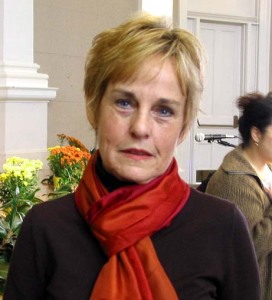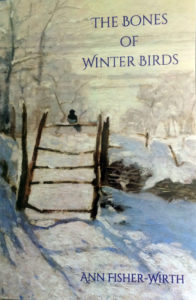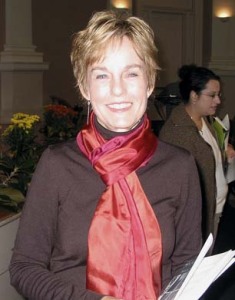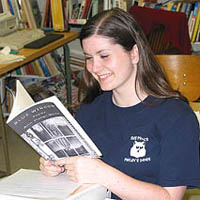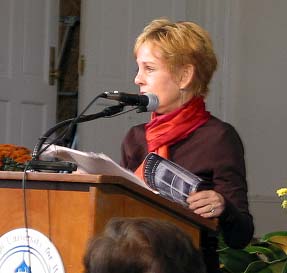Major Works
- The Bones of Winter Birds (poems), 2019
- The Ecopoetry Anthology, co-edited with Laura-Gray Street, Trinity University Press, 2013
- Dream Cabinet (poems), Wings Press, 2012
- Slide Shows, 2009
- Carta Marina: A Poem in Three Parts (Wings Press, 2009)
- The Trinket Poems (2003)
- Blue Window (2003)
- Five Terraces 2005
- William Carlos Williams and Autobiography: The Woods of His Own Nature (published 1989)
Biography of Ann Fisher-Wirth
by Courtney Rowe (SHS); Updated 2019
Early Life
Ann Fisher-Wirth was born Ann Carolyn Welpton in Washington, D.C. on January 25, 1947. Her father was in the United States Army, so at the age of eight months, young Ann moved with her mother and older sister Joan to Germany where her little sister, Jennifer, was born.
The family lived in Germany for three years before moving to Pennsylvania in 1950. Then again, in 1955, the family moved to Camp Zama, Japan. After service in both World War II and The Korean War, her father retired in 1957. The family then moved to Berkeley, California, the place that Ann Fisher-Wirth considers her “spiritual home.”
Education & Jobs
Ann graduated magna cum laude from Pomona College in 1968 with a B.A. in English. She married John Fisher that year, and they moved to Belgium to teach at the International School of Liege until 1971.
Returning to California, she entered Claremont Graduate School from which she received her Ph. D. in English and American Literature in 1982, with a dissertation on the American poet William Carlos Williams.
While in graduate school, Ann and John Fisher had three children: Pascale Elizabeth in 1973, Jessica Margaret in 1776, and Lucas John in 1978.
In 1981, Ann was hired as an assistant professor of English at the University of Virginia. She and John Fisher had divorced shortly after they moved to Virginia.
She married Peter Wirth in 1983, and their son, Caleb Fisher-Wirth, was born in 1983. With Peter’s daughter, Rebecca, the number of her children grew to five.
Publications
Fisher-Wirth has published many articles on American writers, among them Willa Cather, Robert Hass, Cormac McCarthy, Kenneth Rexroth, William Faulkner, and Peter Matthiessen.
Her poems have appeared in many journals, among them the Georgia Review, The Kenyon Review, Feminist Studies, ISLE, the Southwest Review, the Valparaiso Review, Flyway, Florida Review, Natural Bridge, The Comstock Review, ForPoetry.com, Ekphrasis, Petroglyph, Organization and Environment, The Squaw Review, Iris: A Journal About Women, Crossroads, Wilderness, Tundra, and Asheville Poetry Review.
Her first book of poems, Blue Window, was published by Archer Books in September of 2003. Her chapbook of poems, The Trinket Poems, was runner-up in 2003 in the Quentin R. Howard Poetry Chapbook Competition and was published by Wind in June 2003. She then published several more books of poetry, Dream Cabinet and Olaus Magnus, Carta Marina, and her most recent book of poetry, The Bones of Winter Birds (2019). The Ecopoetry Anthology, co-edited with Laura-Gray Street, was published by Trinity University Press in 2013.
Current Position
Since 1988, Fisher-Wirth has taught at the University of Mississippi (Ole Miss) in Oxford where she is a professor of English. In 1994-1995, Ann was the Fulbright Senior Lecturer at the University of Fribourg, Switzerland, and in 2002-2003 she was the Fulbright Distinguished Chair in American Studies at Uppsala University, Sweden.
In addition, Fisher-Wirth teaches and directs the Environmental Studies minor at the University of Mississippi. She also teaches at yoga class in Oxford, Mississippi.
Reviews
A Review of Blue Window
by Courtney Rowe (SHS)
Blue Window is Ann Fisher-Wirth’s first published book of collected poems and promises to be a very successful one. Her poems are saturated with imagery and personal experiences. Every poem seems to address a different emotion or issue. The poems held my attention on every page, each with new thoughts.
Fisher-Wirth’s poems are quite personal and appear to be her out; her way of dealing with her experiences. For instance, in poems such as “The Soft Black Cotton,” “Her Silence,” and “Burning,” she speaks of memories of her parents. Many poems, including some about her parents, are like impressionist paintings. They describe a single moment in time as she remembers it. One example would be her poem “California” in which she describes how she felt while driving back home to California. Color in vivacious hues are strewn thoughout the entire book.
Poems in her book also deal with her family. Family is clearly an important aspect of Ann Fisher-Wirth’s life, and she writes about her children in poems such as “Daughters” and “Gala/Milk.” She also reflects on experiences with her husband not only as a spouse but also as a lover (“Open Like a Rose”). These poems are written passionately.
An entire section of the book is devoted to Mississippi. Nature plays a large role in these poems. One specific poem, “What Is There To Do in Mississippi?” plays on the natural imagery of the state which is eminently depicted in this line “…we just sit silent where Kudzu looms like velvet and chokes the pines.” Some other poems about Mississippi include “Letter From Oxford, Mississippi,” and “Where, Beneath the Magnolia.”
However, Fisher-Wirth’s subjects are not solely about nature and family. She also addresses racism, which she still sees as a major problem even today. Possibly she states her opinion best in “Eddie” with the lines “Maybe you’d say they were just like girls everywhere, and who could blame them for their fierce bonding. But they were white and this was Mississippi.” A handful, at least, of her poems address the isolation of such discrimination.
I thoroughly enjoyed reading Blue Window. Ann Fisher-Wirth speaks of modern issues that are real and present in most people’s lives in some way. Along with the stirring messages, the tonality of the words she chooses are lush and poignant. The poems kept my attention and touched emotions within myself. Her imagery is beautiful, painting clear pictures while still getting the underlying message across.
I certainly recommend this book to any mature lover of poetry. A number of verses can be somewhat explicit. However, the book is a memorable work of literature. A review by Sharon Dolin sums everything up when she say, “Blue Window is a beautiful blessing of a book.”
Interview with Ann Fisher-Wirth (2003)
by Courtney Rowe (SHS)
Dear Courtney,
It is so nice to hear from you. I am delighted that you liked Blue Window and I appreciated your honesty as well as your praise. It’s exciting that you are reading it for your class.
When did you first decide to become a writer, and what was it that inspired you to do so?
I suppose my mother was the person who inspired me to write, in that she loved books and surrounded my childhood with stories. We were always read to; we didn’t have a TV; and we were encouraged to express ourselves. I started writing as a little kid, but at that time what I wanted to write was a mystery novel, copying Nancy Drew books. As a teenager I wrote poems, and then stopped for a number of years. In my late twenties, while I was supposed to be writing my dissertation, I wrote many more poems–and then stopped again for a number of years. About ten years ago I started writing poetry seriously, and this time I will never stop, because I love it too much.
Who is your favorite author now? In high school?
My favorite author in high school was T. S. Eliot. I fell madly in love with him when I read “The Love Song of J. Alfred Prufrock,” and wanted to go to England to marry him. There were many things about T. S. Eliot that I did not realize at the time–among them, that he was nearly sixty when I was born.
I don’t have a favorite author now; I have tons of favorite authors. Among the poets would be John Keats, William Carlos Williams, Elizabeth Bishop, and Eliot.
What author has influenced you the most?
I wrote my dissertation on William Carlos Williams. I suppose that he has influenced me most of all, in his insistence that everything in life can be material for poetry; his willingness to experiment and create; and the way he combined domestic life (he was a husband and a father) with professional life (he was a pediatrician and ob/gyn who delivered thousands of babies) with life as a writer (he published nearly 40 books).
Who (not necessarily an author) has inspired you the most in your life?
Probably my mother has inspired me most in my life. And my husband Peter. And my children.
What kind of student were you in high school?
In high school, to tell you the truth, I pretty much did what I wanted to do. I got A’s in the courses I cared about–like English, French, dance–B’s in history and science courses, and a couple of C’s. Math and I parted company young. I went to a demanding high school, so I did study, but I did not become a truly excellent student until my sophomore year in college.
I understand that Blue Window is your first published book [of poetry]. Tell me about your experience and how you feel about this accomplishment.
Blue Window is my first published book of poetry, though my first published book is actually a work of literary criticism, William Carlos Williams and Autobiography: The Woods of His Own Nature. It feels absolutely tremendous to have a book of poems out. It is just an enormous pleasure and I am enjoying every minute of it.
Do you have any other collections of poetry, or other writings, that you are currently planning to try to publish?
I have a chapbook, The Trinket Poems, coming out from Wind publishers this spring: it was a runner-up in the Quentin R. Howard 2003 Poetry Chapbook Competition. (A chapbook is a collection of poems about half as long as a regular book). I have recently finished two book-length manuscripts of poetry. The first is called Dream Cabinet, and the second, which I have written this year in Sweden, is called Olaus Magnus, Carta Marina. (Olaus Magnus was a famous cartographer who, in 1539, published the first great map of the Northern lands; there are only two copies of this map in the world, and one of them is at the library here in Uppsala, Sweden, where I have been teaching this year). I will start looking for publishers for both these books once we go back to Mississippi in June.
Your poems seem to be very personal and often times explicit. How did you and/or your family feel about revealing such thoughts?
My poems are personal, that’s true. And some of them are, as you say, explicit. My family is cool with that; we are all pretty open with each other and with the world. After about a year ago the poet Lucille Clifton came to read at the University of Mississippi. A lot of her poetry is extremely frank and brave, and someone in the audience asked her how she dared to write it and read it. She said, “Everything human is my business as an artist.” I agree with that. Something in us dies when we cannot be truthful–and, quite simply, you can’t write well unless you give yourself the freedom to go wherever the writing needs to go. Then, you usually find there’s nothing to be afraid about. Most people are hungry for honesty.
How has living in Mississippi influenced your writing?
I think of California and Mississippi as my two “homes”–I was raised in Berkeley and have lived in Oxford for nearly 15 years. One section of Blue Window is poems about Mississippi, as you know. Mississippi has influenced my writing in several ways. Its land and waters are strange (to a Californian), mysterious, and beautiful; its human history is complex and fraught with the struggle for freedom and justice; and its relationship to language, both spoken and written, is incredibly rich.
Lastly, do you have any advice to aspiring writers about writing or even life in general?
My advice to aspiring writers is simple. Turn off the TV. Get outside. Read. Read. Read. Find the center of yourself, whatever or wherever that may be. Pay attentions, both to yourself and to the world around you. Find things and people to love. And write. Write. Write. That’s pretty similar to my advice about life.
Related Websites
- Ann Fisher-Wirth receives the 2014 Elsi M. Hood Outstanding Teaching Award
- From the Encyclopedia of American Poetry: The Twentieth Century Fisher-Wirth’s analysis of William Carlos Williams’ poem “Asphodel, That Greeny Flower.”
- English professor, poet Ann Fisher-Wirth awarded state arts commission grant, Oct. 14, 2004
- Fisher-Wirth’s home page at Ole Miss.
Bibliography
- Fisher-Wirth, Ann. Blue Window. Los Angeles: Archer, 2003.
- ______________ . Email interview. May 7, 2003 by Courtney Rowe
- ______________ . Email interview. May 13, 2003.
- ______________ . Email interview. May 15, 2003.

